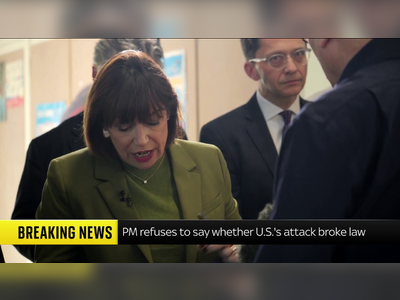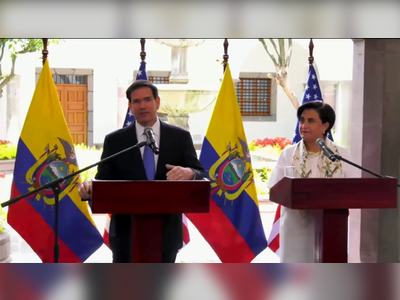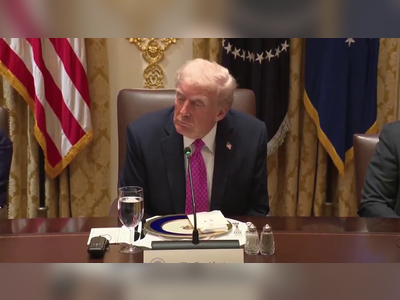
Biden Is Right About Saudi Arabia
The president is sacrificing his values in the interests of something we haven’t seen much of in the past two decades: realism.
I regret to inform you that Joe Biden is right to go to Saudi Arabia.
Biden’s planned visit to the kingdom represents a determination to both rationalize the amount of attention we pay to the region and formulate a foreign policy that works on behalf of the American middle class. But it is not going to make anyone happy in the near term, and it is going to cost him precious political capital with his own party.
In the two decades since the September 11 attacks, elite opinion in the United States regarding the Kingdom of Saudi Arabia has finally caught up to where popular opinion has been headed for some time. American elites—to include elected and appointed officials—have come to resent the historically close relationship between the United States and Saudi Arabia. This resentment is bipartisan, but is most keenly felt within the more progressive ranks of the president’s party.
The ascension of Crown Prince Mohammed bin Salman as the kingdom’s de facto leader has accelerated the decline in relations between the two countries. For many Americans, elites and non-elites alike, the brutal murder of the Saudi dissident and Washington Post columnist Jamal Khashoggi—approved, according to U.S. intelligence, by the crown prince himself—was the last straw.
Biden himself, on the campaign trail, had promised to make Saudi Arabia “a pariah state,” and that’s where his political problems started. Because his apparent decision to now visit the kingdom and meet with the crown prince has unsurprisingly angered as many of his supporters as his critics.
I served on two occasions in the Obama administration in positions responsible for formulating our defense policy in the Middle East. In the first instance I served in a very junior role, and in the second instance I was somewhat more senior. But I have steered clear of the region since leaving government, and I have no personal or professional interests in seeing relations between the United States and Saudi Arabia thaw.
I do maintain long-standing friendships with some of the American and Saudi policy makers trying to improve relations between the two countries, though, and I have also spent a little time with both President Biden and MBS over the years. I staffed the former on a week-long trip to the region in 2016, and I have met the latter a handful of times, almost always in an official capacity. I feel highly confident that neither man could pick me out of a police lineup.
But I have also spent a bit of time over the past month with progressive critics of this administration’s Middle East policy, most of them longtime friends, trying to understand not only their frustrations with this administration but also what they would like to see by way of an alternative.
I should state up front that I have enjoyed my visits to Saudi Arabia over the years and have a lot of Saudi friends. I find the regular Saudis I have met to be warm and welcoming, I have a soft spot for Jahili poetry, and I get upset when progressives veer away from criticizing Saudi Arabia’s leadership and policies and into outright bigotry toward the Saudi people and their culture.
For the most part, however, that has not been the case. Progressives had been genuinely hopeful that the Biden administration might re-center human rights as part of America’s foreign policy following President Donald Trump’s years in office, and they view sitting down with MBS as a betrayal of those hopes.
It might be useful, though, to group the progressive critics of the Biden administration’s approach to Saudi Arabia into two camps. The first camp includes those critics working within the administration itself, either as political appointees or in career roles. These critics of the administration’s policies tend to focus their frustrations on the president’s closest adviser on the region, Brett McGurk. They tend to blame McGurk for the administration de-prioritizing progressive policy goals like Palestinian self-determination in favor of what they view as the appeasement of morally dubious regional strongmen—including, but certainly not limited to, MBS.
Progressive critics outside the administration, meanwhile, tend to focus less on Biden’s advisers and more on Biden himself. Biden—and not his advisers, they argue—was the one who promised a different approach to Saudi Arabia and the rest of the region. I have a lot more sympathy for this latter camp, and not only because I find it distasteful when feckless bureaucrats call attention to their own fecklessness in largely anonymous attacks on a colleague. Joe Biden is the president, and he is the one ultimately responsible for everything his administration does and does not do. He is also the one who picks the advisers he listens to.
Many progressives in both camps have long argued that the United States spends way too much time and resources on the region, and it’s hard to argue they are wrong. I earnestly contend that U.S. policy in the region has been a success when graded against our consistently stated interests in the region: We have helped secure the state of Israel, we have safeguarded the sea lanes in and around the resource-rich Arabian Peninsula, and we have effectively countered most major threats posed by transnational terrorists and the proliferation of weapons of mass destruction.
But has our strategy been cost-effective? Surely not. When I last left the Pentagon, in 2017, we still had nearly 60,000 troops in the region—not counting those in Afghanistan. We send billions of dollars in aid to Israel, Egypt, Lebanon, and Jordan annually in the form of foreign-military financing and other direct assistance. And we fought a long, costly war in Iraq that left thousands of Americans dead and burned up more than $1 trillion that will never be spent on American roads and schools.
Less visibly, American policy makers have spent innumerable hours focusing on the region that they could have spent focusing on other foreign and domestic challenges. The Middle East has sucked up far too much of the oxygen in the room—in the Situation Room, specifically—since the end of the Cold War.
Presidents Obama, Trump, and Biden might not agree on much, but I think they would all agree with that last sentence. Yet the normalization process that began between Israel and its Gulf neighbors during the Trump administration represents an opportunity to reset expectations for an American commitment to the region.
The growing ties between Israel and the Gulf States have created a strong counterweight to malign Iranian influence in the region. Should Israel enjoy closer political, military, and even commercial relations with the Gulf, future American presidents could assume more risk regarding the U.S. commitment to the region. Democrats have a lot to criticize from the Trump years, yet the Abraham Accords shouldn’t be one of those things. But I fear the normalization process won’t go any further without Saudi Arabia on board.
In addition, most Democrats now recognize that President Trump stole what should have been progressive applause lines with his inartful yet relentless focus on connecting U.S. foreign policy back to the everyday concerns of Americans—and especially the American working class. On everything from jobs to gas prices, Trump happily found bogeymen abroad, and horrified foreign-policy elites by describing what had been long-standing relationships in starkly transactional terms.
Part of this was political posturing, of course: It’s always easier to blame a foreigner than push forward your own positive domestic agenda to address our long-term challenges. But another part of this derived from a basic understanding that what foreigners do often does matter to American voters. Chinese theft of intellectual property harms the bottom line of the corporations Americans need to employ them. Production limits set by OPEC affect not only the Texas oil patch but the retail gas prices Americans see at the pump. Like it or not, Saudi Arabia remains the second-largest oil-producing country on planet Earth and a key player in the global economy—even more so since the war in Ukraine helped send energy prices soaring.
This might sound old-fashioned, but even if you beat up foreign leaders in speeches or tweets intended for domestic consumption, you can still endeavor to negotiate with them on friendlier terms in private. Why, I ask my progressive friends, can we not do that in Saudi Arabia? Why can we have an ambassador to China, or to Russia even, but not Saudi Arabia? Why can the president sit down with Brazilian President Jair Bolsonaro—a man who fervently and loudly asserts that the 2020 election was stolen from Donald Trump—yet not MBS?
Almost my entire professional life—ever since I first put on an Army uniform during the infamous “dual containment” years—has been shaped by an American commitment to the Middle East that has demanded more blood and treasure than the region deserves. I marched off to a disastrous war in 2003 based in part on allegedly values-based arguments that make me cringe when I reread them today.
Biden, for his part, is sacrificing his values today in the interests of something we haven’t seen much of in the past two decades: realism.
And as unpopular as it may be among people I respect, I’m okay with that.
Biden’s planned visit to the kingdom represents a determination to both rationalize the amount of attention we pay to the region and formulate a foreign policy that works on behalf of the American middle class. But it is not going to make anyone happy in the near term, and it is going to cost him precious political capital with his own party.
In the two decades since the September 11 attacks, elite opinion in the United States regarding the Kingdom of Saudi Arabia has finally caught up to where popular opinion has been headed for some time. American elites—to include elected and appointed officials—have come to resent the historically close relationship between the United States and Saudi Arabia. This resentment is bipartisan, but is most keenly felt within the more progressive ranks of the president’s party.
The ascension of Crown Prince Mohammed bin Salman as the kingdom’s de facto leader has accelerated the decline in relations between the two countries. For many Americans, elites and non-elites alike, the brutal murder of the Saudi dissident and Washington Post columnist Jamal Khashoggi—approved, according to U.S. intelligence, by the crown prince himself—was the last straw.
Biden himself, on the campaign trail, had promised to make Saudi Arabia “a pariah state,” and that’s where his political problems started. Because his apparent decision to now visit the kingdom and meet with the crown prince has unsurprisingly angered as many of his supporters as his critics.
I served on two occasions in the Obama administration in positions responsible for formulating our defense policy in the Middle East. In the first instance I served in a very junior role, and in the second instance I was somewhat more senior. But I have steered clear of the region since leaving government, and I have no personal or professional interests in seeing relations between the United States and Saudi Arabia thaw.
I do maintain long-standing friendships with some of the American and Saudi policy makers trying to improve relations between the two countries, though, and I have also spent a little time with both President Biden and MBS over the years. I staffed the former on a week-long trip to the region in 2016, and I have met the latter a handful of times, almost always in an official capacity. I feel highly confident that neither man could pick me out of a police lineup.
But I have also spent a bit of time over the past month with progressive critics of this administration’s Middle East policy, most of them longtime friends, trying to understand not only their frustrations with this administration but also what they would like to see by way of an alternative.
I should state up front that I have enjoyed my visits to Saudi Arabia over the years and have a lot of Saudi friends. I find the regular Saudis I have met to be warm and welcoming, I have a soft spot for Jahili poetry, and I get upset when progressives veer away from criticizing Saudi Arabia’s leadership and policies and into outright bigotry toward the Saudi people and their culture.
For the most part, however, that has not been the case. Progressives had been genuinely hopeful that the Biden administration might re-center human rights as part of America’s foreign policy following President Donald Trump’s years in office, and they view sitting down with MBS as a betrayal of those hopes.
It might be useful, though, to group the progressive critics of the Biden administration’s approach to Saudi Arabia into two camps. The first camp includes those critics working within the administration itself, either as political appointees or in career roles. These critics of the administration’s policies tend to focus their frustrations on the president’s closest adviser on the region, Brett McGurk. They tend to blame McGurk for the administration de-prioritizing progressive policy goals like Palestinian self-determination in favor of what they view as the appeasement of morally dubious regional strongmen—including, but certainly not limited to, MBS.
Progressive critics outside the administration, meanwhile, tend to focus less on Biden’s advisers and more on Biden himself. Biden—and not his advisers, they argue—was the one who promised a different approach to Saudi Arabia and the rest of the region. I have a lot more sympathy for this latter camp, and not only because I find it distasteful when feckless bureaucrats call attention to their own fecklessness in largely anonymous attacks on a colleague. Joe Biden is the president, and he is the one ultimately responsible for everything his administration does and does not do. He is also the one who picks the advisers he listens to.
Many progressives in both camps have long argued that the United States spends way too much time and resources on the region, and it’s hard to argue they are wrong. I earnestly contend that U.S. policy in the region has been a success when graded against our consistently stated interests in the region: We have helped secure the state of Israel, we have safeguarded the sea lanes in and around the resource-rich Arabian Peninsula, and we have effectively countered most major threats posed by transnational terrorists and the proliferation of weapons of mass destruction.
But has our strategy been cost-effective? Surely not. When I last left the Pentagon, in 2017, we still had nearly 60,000 troops in the region—not counting those in Afghanistan. We send billions of dollars in aid to Israel, Egypt, Lebanon, and Jordan annually in the form of foreign-military financing and other direct assistance. And we fought a long, costly war in Iraq that left thousands of Americans dead and burned up more than $1 trillion that will never be spent on American roads and schools.
Less visibly, American policy makers have spent innumerable hours focusing on the region that they could have spent focusing on other foreign and domestic challenges. The Middle East has sucked up far too much of the oxygen in the room—in the Situation Room, specifically—since the end of the Cold War.
Presidents Obama, Trump, and Biden might not agree on much, but I think they would all agree with that last sentence. Yet the normalization process that began between Israel and its Gulf neighbors during the Trump administration represents an opportunity to reset expectations for an American commitment to the region.
The growing ties between Israel and the Gulf States have created a strong counterweight to malign Iranian influence in the region. Should Israel enjoy closer political, military, and even commercial relations with the Gulf, future American presidents could assume more risk regarding the U.S. commitment to the region. Democrats have a lot to criticize from the Trump years, yet the Abraham Accords shouldn’t be one of those things. But I fear the normalization process won’t go any further without Saudi Arabia on board.
In addition, most Democrats now recognize that President Trump stole what should have been progressive applause lines with his inartful yet relentless focus on connecting U.S. foreign policy back to the everyday concerns of Americans—and especially the American working class. On everything from jobs to gas prices, Trump happily found bogeymen abroad, and horrified foreign-policy elites by describing what had been long-standing relationships in starkly transactional terms.
Part of this was political posturing, of course: It’s always easier to blame a foreigner than push forward your own positive domestic agenda to address our long-term challenges. But another part of this derived from a basic understanding that what foreigners do often does matter to American voters. Chinese theft of intellectual property harms the bottom line of the corporations Americans need to employ them. Production limits set by OPEC affect not only the Texas oil patch but the retail gas prices Americans see at the pump. Like it or not, Saudi Arabia remains the second-largest oil-producing country on planet Earth and a key player in the global economy—even more so since the war in Ukraine helped send energy prices soaring.
This might sound old-fashioned, but even if you beat up foreign leaders in speeches or tweets intended for domestic consumption, you can still endeavor to negotiate with them on friendlier terms in private. Why, I ask my progressive friends, can we not do that in Saudi Arabia? Why can we have an ambassador to China, or to Russia even, but not Saudi Arabia? Why can the president sit down with Brazilian President Jair Bolsonaro—a man who fervently and loudly asserts that the 2020 election was stolen from Donald Trump—yet not MBS?
Almost my entire professional life—ever since I first put on an Army uniform during the infamous “dual containment” years—has been shaped by an American commitment to the Middle East that has demanded more blood and treasure than the region deserves. I marched off to a disastrous war in 2003 based in part on allegedly values-based arguments that make me cringe when I reread them today.
Biden, for his part, is sacrificing his values today in the interests of something we haven’t seen much of in the past two decades: realism.
And as unpopular as it may be among people I respect, I’m okay with that.











